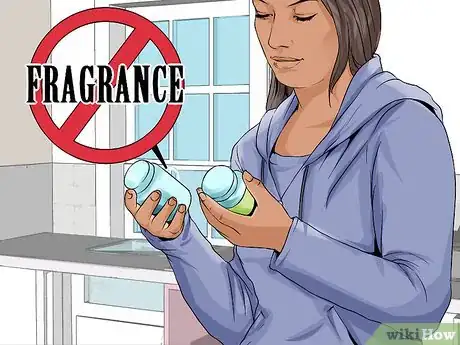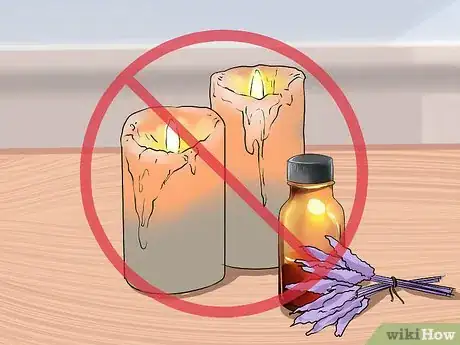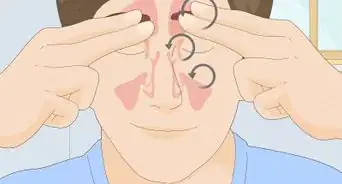This article was co-authored by Alan O. Khadavi, MD, FACAAI. Dr. Alan O. Khadavi is a Board Certified Allergist and a Pediatric Allergy Specialist based in Los Angeles, California. He holds a BS in biochemistry from the State University of New York (SUNY) at Stony Brook and an MD from the State University of New York Health Science Center at Brooklyn. Dr. Khadavi completed his pediatric residency at Schneider Children’s Hospital in New York, and then went on to complete his allergy and immunology fellowship and pediatric residency at Long Island College Hospital. He is board certified in adult and pediatric allergy/immunology. Dr. Khadavi is a Diplomate of the American Board of Allergy and Immunology, a Fellow of the American College of Allergy, Asthma & Immunology (ACAAI), and a member of the American Academy of Allergy, Asthma & Immunology (AAAAI). Dr. Khadavi's honors include Castle Connolly’s list of Top Doctors 2013-2020, and Patient Choice Awards "Most Compassionate Doctor" in 2013 & 2014.
wikiHow marks an article as reader-approved once it receives enough positive feedback. In this case, 85% of readers who voted found the article helpful, earning it our reader-approved status.
This article has been viewed 88,526 times.
If you are sensitive to scents, you are not alone. Many people have scent sensitivities, which may make certain fragrances irritating. Scents from perfumes, laundry detergents, and household cleaners may produce unwanted symptoms similar to an allergic reaction.[1] If you suffer from scent sensitivity, there are steps you can take to cope. Deal with unwanted scents in your own living situation with devices like air purifiers. Talk to coworkers, family members, and friends about your issues and politely request they minimize their use of scented products around you. Make sure you choose fragrance-free products for your home and know what kind of chemicals to avoid.
Steps
Coping with Unwanted Scents
-
1Track your triggers. It can be helpful to know what kind of scents bother you. If a particular brand of perfume or laundry detergent causes an adverse reaction, you should know so you can avoid that brand in the future. Keep a journal chronicling when and where you have a bad reaction to a smell.
- It may be hard to identify the precise trigger every time, but try to notice when symptoms arise. Jot down any probable cause, from scents from outdoors to household products.
- Take your journal with you to work or social events. Such places can sometimes be ripe with unwanted scents that may trigger a reaction.
- Keeping your journal in a "notes" section on your smartphone can make it easy to access it.
-
2Be prepared for events with a lot of scents. There are certain events where you may be exposed to a lot of unwanted scents. During formal parties, for example, many people may be wearing perfumes or colognes. Prepare as much as you can before these events. If you find such events are particularly harsh on your sensitivity, consider sitting them out.
- If you're on any medications that help with your sensitivity, bring these to parties.
- You may want to stay close any open windows during these kinds of events.
- Try occasionally stepping outside if a smell is bothering you.
Advertisement -
3Try to minimize your exposure as much as you can. One of the best means to minimize reactions is to keep your exposure low. This is especially important if your reactions are intense. Try to stay away from scents that bother you.[2]
- Avoid stores where there are heavy odors, such as department stores that use a lot of chemical cleaners.
- If you notice a product you use at home, like a cleaner, is bothering your sensitivity, cease use immediately.
- Ask your household members to minimize their own use of scented products.
-
4Get a flu shot. Scent sensitivity is sometimes caused by an allergic reaction. If your body is in a weakened state due to illness, your allergies will be more acute. It's a good idea to get a flu shot during cold and flu season.[3]
- Talk to your doctor before getting a flu shot to make sure the shot is safe for you given your medical history and any existing medical conditions.
-
5Invest in an air purifier or a fan. A fan or an air purifier may help rid your home of unwanted scents. You can purchase such items online or at a local department store. See if symptoms improve by placing some fans and air purifiers in your home.
-
6Seek a doctor's input. If you suffer from scent sensitivity, it's a good idea to talk to a doctor. Scent sensitivity is not just an inconvenience. It's a legitimate medical condition. It's well-documented that many people react with allergic reactions such as rashes in response to certain fragrance. While most people must have direct physical contact with a fragrance containing substance, some people's scent sensitivity is so severe they may break out into rashes just from inhaling a smell.[4]
- Part of your medical evaluation may include blood work, urinalysis, pulmonary function testing, and evaluation for mood disorders (such as depression and/or anxiety).
- A simple patch test can be used to diagnose an allergy to a specific scent. Patches containing a potential irritant will be placed on your skin. After 48 hours, your doctor will remove such patches and examine your skin for a reaction.
- If you do have an allergy, your doctor can help you come up with an action plan for treatment. They may recommend medications or lifestyle changes that help you cope with scent sensitivity.
Dealing with Others
-
1Educate others about scent sensitivity. Perfumes, scented lotions, and scented laundry detergents are popular with many. People who use such products, however, may not realize the effect certain scents have on others. Work to educate friends, family members, and co-workers on scent sensitivity. Let them know what they can do to help you deal.[5]
- Be courteous as you talk to others about your sensitivity. Many people have not heard of scent sensitivity, and may be confused as to what it is. Have patience and explain yourself slowly.
- If you have an official doctor's diagnosis, it can be helpful to let people know what precise condition is causing your sensitivity. For example, you may have an allergy to a particular chemical that's commonly used in scented products.
- You can also refer people to outside resources. If you know a website that discusses scent sensitivity, advise people to check out that site.
-
2Ask people politely to minimize their use of certain products. Scent sensitivity can be a real problem at work, school, or elsewhere. If you live or work with others who use a lot of scented products, politely talk to them about your issues. You can respectfully request that they minimize use of certain products near you.[6]
- Try to approach people in a friendly fashion. People don't want to feel like they're being scolded. For example, you can approach a co-worker and say something like, "Clara, I wanted to ask you about something. As you know, I have a scent sensitivity. If you could leave your scented lotion at home, I would really appreciate that as the smell can trigger asthma attacks. I don't want you to feel bad, and I'm sorry if it's an inconvenience, but I just want to be able to work effectively."
- If unwanted scents are a major issue at work, talk to your boss. There may be a policy in place in your office regarding the use of potential allergens.
-
3Explain it is not personal. Many people will take your request to cut back on scented products as a personal judgment. A significant other may, for example, think you dislike the smell of their perfume and are trying to be polite. Calmly explain the issue is not personal, but it's a medical concern.
- Make sure the other person knows it's about the scent's effect on you. You can say something like, "It has nothing to do with you. I get allergy attacks walking by Bath and Body Works in the mall sometimes."
- Reassure the other person there are no hard feelings. You simply do not want to be routinely exposed to an allergen.
-
4Ask your boss about altering your work environment. If your scent sensitivity is causing problems at work, talk to your boss. You may be able to get them to accommodate your needs with a better work environment. You could request an air purifier in your office, for example, or a cubicle near a window.
-
5See if you can have some flexibility in your work schedule. A more flexible schedule can also help you cope with scent sensitivity. Schedule a meeting with your boss and explain the issue you're having. Ask him or her if a flexible schedule would be possible to accommodate your needs.[7]
- There are a variety of ways a flexible schedule can help you cope with scent sensitivity. You could work from home certain days or Skype into meetings.
- You could also come into work earlier or later some days, minimizing the time you spend with other coworkers who may use products that trigger your sensitivity.
Avoiding Certain Products
-
1Learn how to recognize products that are truly fragrance-free. If you have a scent sensitivity, it's a good idea to use lotions, laundry detergents, and other products that are fragrance-free; however, be careful when choosing products. You want to make sure you are getting a product that truly lacks the chemicals that can trigger allergic reactions for people with a scent sensitivity.[8]
- If a product is labeled "fragrance-free," this means it does not contain any chemicals or compounds known to trigger allergic reactions.
- If a product is labeled "unscented," it may contain compounds and chemicals that contain potential allergens even if the product itself lacks a smell.
-
2Scan labels for certain chemicals. Certain chemicals are likely to affect scent sensitivity. When purchasing a product, scan the label for the following chemicals:
- Acetone
- Alpha-Pinene
- Alpha-Terpineol
- Benzyl Acetate
- Benzyl Alcohol
- Benzaldehyde
- Camphor
- Ethanol
- Ethyl Acetate
- g-Terpinine
- Limonene
- Linalool
-
3Avoid products like scented candles. Scented candles are best avoided if you have a scent sensitivity. They often contain chemicals that can trigger an allergic reaction. Do not use scented candles in your home, or air fresheners that contain similar chemicals. If you want to freshen up the smell of your house, try bringing flowers in from outdoors. Natural scents may be less likely to bother your sensitivity.[9]
-
4Be cautious around the holiday season. Smells can be a huge problem around the holiday season. Artificial scents and natural scents are present during this time of year. Work on minimizing your exposure to cope.[10]
- It may be better to use an artificial tree, as pollen from natural trees can cause allergic reactions. Go for a tree that is fragrance-free.
- If you're invited to parties, politely let the hosts know that you have a scent sensitivity. Inform them what they can do to help, such as avoiding lighting scented candles.
- Take precautions when going shopping around Christmas, as stores may use a lot of artificial scents during the Christmas season. You may want to bring any medication a doctor has prescribed for your sensitivity with you when shopping.
Warnings
- Scent sensitivities can worsen over time, especially after you are confronted with the same scent repeatedly. Symptoms and their severity ranges for each person but can include rashes, dizziness, runny nose, difficulty breathing and coughing. The onset of symptoms can take a few minutes or several days.⧼thumbs_response⧽
References
- ↑ https://invisibledisabilities.org/ida-books-pamphlets/chemicalsensitivities/whygofragrancefree/
- ↑ Alan O. Khadavi, MD, FACAAI. Board Certified Allergist. Expert Interview. 29 July 2020.
- ↑ https://health.clevelandclinic.org/2014/12/how-to-keep-holiday-scents-from-causing-asthma-attacks/
- ↑ http://allergicliving.com/2014/01/13/fragrance-sensitivity-hard-to-breathe-tough-to-touch/
- ↑ http://www.payscale.com/career-news/2015/06/4-ways-to-survive-fragrance-sensitivity-in-the-office
- ↑ http://www.payscale.com/career-news/2015/06/4-ways-to-survive-fragrance-sensitivity-in-the-office
- ↑ http://www.payscale.com/career-news/2015/06/4-ways-to-survive-fragrance-sensitivity-in-the-office
- ↑ http://www.besthealthmag.ca/best-looks/beauty/fragrance-sensitivity/
- ↑ https://health.clevelandclinic.org/2014/12/how-to-keep-holiday-scents-from-causing-asthma-attacks/

























-Step-17-Version-3.webp)


















































